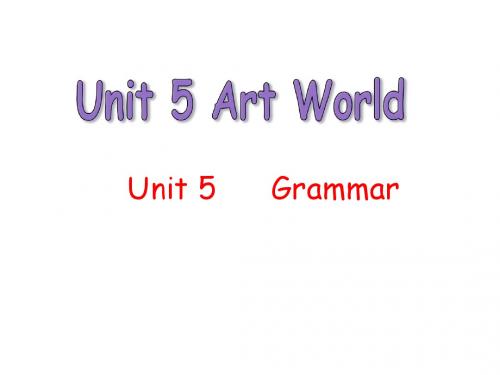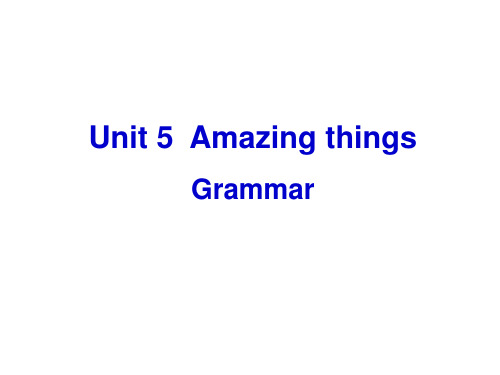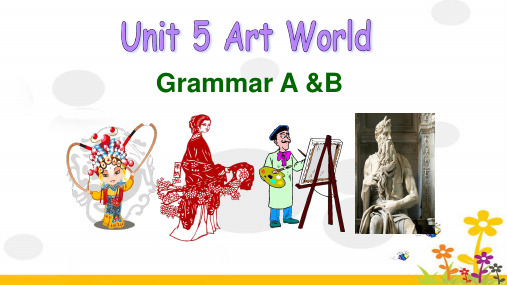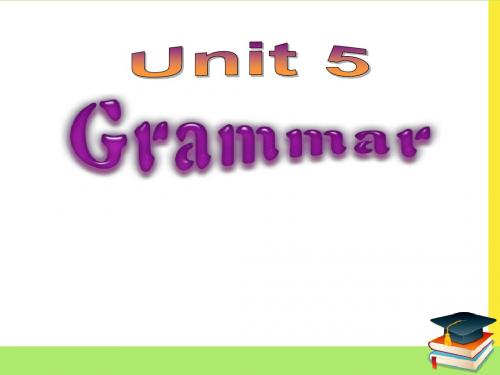Unit 5 Grammar 牛津英语
初中英语九年级上册(牛津译林版)Unit5Grammar教学设计

4.通过小组讨论、角色扮演等活动,提高学生的英语口语表达能力和听力理解能力,使他们在真实的语言环境中能够熟练运用所学知识进行交流。
(二)过程与方法
1.采用任务型教学法,让学生在完成具体任务的过程中,自主探究、合作学习,培养他们发现问题、解决问题的能力。
4.结合本章节的内容,教育学生关爱家人、朋友,珍惜与他们共度的时光,树立正确的人生价值观。
二、学情分析
九年级的学生已经具备了一定的英语基础,他们对英语语法知识有了一定的了解和掌握,但在实际运用中仍存在一些困难。特别是对于时态的运用,学生容易混淆,需要进一步巩固和练习。在本章节的学习中,学生将通过具体的语境,深入理解和运用一般过去时、现在完成时和过去进行时。此外,学生在团队合作和口语表达方面有待提高,需要教师在教学过程中给予关注和指导。针对学生的实际情况,本章节的教学应注重以下方面:
(三)情感态度与价值观
1.培养学生热爱英语学习的情感,激发他们学习英语的兴趣和自信心,使他们在学习过程中始终保持积极的态度。
2.通过学习英语,帮助学生拓宽国际视野,了解不同文化背景下的生活习俗,培养他们的跨文化交际意识。
3.在课堂教学中,注重培养学生的团队合作精神,让他们学会相互尊重、相互帮助,提高人际交往能力。
五、作业布置
为了巩固本节课所学的一般过去时、现在完成时和过去进行时的语法知识,以及提高学生的实际应用能力,特布置以下作业:
1.书面作业:
a.完成教材Unit 5 Grammar部分的练习题,包括填空、选择、改写句子等,要求学生在规定时间内独立完成。
b.结合自己的周末生活,用一般过去时、现在完成时和过去进行时各写一段话,描述自己做过的事情,字数不少于100字。
牛津译林版九年级上册英语课件:Unit5 Grammar

because常用来回答why引导的疑问句: —Why didn't he go with us today? 他今天为什么没跟我们一起去? —Because he was too tired. 因为他太累了。
汉语里我们习惯说“因为…所以…”,但 在英语中不能将because和so连用。 e.g. Because my bike was broken, I went to school by bus today. (√) Because my bike was broken, so I went to school by bus today.(×)
注意:和because相比,since和as 的语气稍弱。
An art festival
1. Daniel decided to play the violin at the art festival. He is good at it. Daniel decided to play the violin at the ___________________________________ art festival since/as he is good at it. ___________________________________ 2. Kitty will dance at the song and dance show. She has to practise hard these days. Since/As Kitty will dance at the song and dance ___________________________________ show, she has to practise hard these days. ___________________________________ 3. Sandy will design the posters for the art festival. She can draw very well. Sandy will design the posters for the art ___________________________________ festival since/as she can draw very well. ___________________________________
Unit5Grammar语法一般将来时七年级英语上册单元语法(牛津深圳版)

班级姓名学号分数Unit 5 Visiting the moon一般将来时(时间:60分钟,满分:100分)一般将来时:将来某个时间要发生的动作或者存在的状态,常与一些表示将来的时间的状语连用。
1.基本结构:一般由“助动词will+动词原形”或者“be going to +动词原形”构成。
2.注意:will是助动词,不能独立使用,否定形式是will not,缩写为won’t.3.时间状语:tomorrow,next time/week ,in a month/week,from now on ,soon.4.基本句型:(1)肯定句:主语+will/be going to +动词原形+其他如:He will e here at once.(2)否定句:主语+won’t/be not going to +动词原形+其他如:He will not go to Shenzhen.(3)一般疑问句:Will+主语+动词原形+其他?Be(am,are,is)+主语+动词原形+其他?如:Will you help me with my English?Are you going to Happy Valley of Shenzhen?(4)特殊疑问句:疑问词+一般疑问句?What will the students have for breakfast?5.will 和be going to 的区别:(1)will :与主观意图无关的将来,表示必然要发生的客观规律。
如:The flowers will e out in a few days.(2)be going to:一般表示计划、打算或准备要做的事情,和有迹象将发生或肯定要发生的事情。
如:Look! It’s going to rain.一、单项选择(本大题共50小题,每小题2分,共100分)1.Don’t return the video to Peter. I am going ________ it this evening.A.to watch B.watch C.watches D.watching2.Tomorrow is Saturday, we ________ my grandparents.A.visit B.are going to visit C.will visits D.are visiting3.Children’s Day is ing. I ________ a new bike for my daughter.4.The girl wants a new dress. She ________ it to her friend’s party.A.wears B.wore C.is wearing D.is going to wear 5.Perhaps there ______ terrible air pollution in the next few years.A.will have B.will beC.is going to have D.will be able to6.My father hopes you _________ to my home.A.will can e B.are e C.to e D.will e 7.—What’s your weekend plan? — I _______ football with my friends.A.play B.will play C.am playing D.is going to play 8.Mother ________ me a nice gift on my next birthday.A.will gives B.gives C.give D.will give 9.They _________ an English night next Sunday.A.are having B.are going to have C.will having D.is going to have 10.We have no vegetables in the fridge. I _________ and buy some.A.went B.was going C.will go D.to go 11.There ______ a talent show in our school tomorrow.A.are going to be B.are going to have C.is going to have D.is going to be 12.My parents ________ a birthday party for me the day after tomorrow.A.has B.have C.will have D.had13.The seeds ________ if you plant them in the soil.A.grow B.grew C.will grow D.are growing 14.There are many clouds ing. It ________ rain soon.A.am going to B.are going to C.is going to D.be going to 15.Is there going to ________ a football match in the stadium next month?A.being B.have C.be D.having 16.—Will they go out for a picnic?—______. They’ll fly kites in the park.A.Yes, they will B.No, they don’t C.No, they won’t D.Yes, they do 17.The weather ______ warm tomorrow.A.gets B.get C.are going to get D.will get 18.—________ they play games tomorrow afternoon?A.Will; will B.Are; are C.Do; do D.Did; do 19.The Smiths _________ the West Lake in Hangzhou next week.A.visit B.visitedC.visits D.are going to visit20.There ________ a meeting next weekend.A.is going to have B.is going to be C.will have D.has21.—Will his parents go to Japan tomorrow?—No, ________.A.they doesn’t B.they won’t C.they aren’t D.they don’t 22.Next month the children ________ to London with their parents.A.fly B.flew C.will fly D.is flying 23.—Do you buy any sugar, Lily?—Sorry, Mum. I ________ and buy some now.A.am going B.go C.went D.will go 24.What ________ you ________ tomorrow?A.do; do B.are; going C.do; going to do D.are; going to do 25.—________ you go climbing with us tomorrow?一Sorry. I stay at home with my parents tomorrow.A.Shall; will B.Are; will C.Do; am going to D.Will; am going to 26.There ________ a home robot for a family in the future, I think.A.will have B.has C.have D.will be 27.—Why are you in such a hurry, Mike?—There _______ an NBA basketball game in ten minutes.A.will have B.is going to have C.will be D.are going to be 28.Bill ________ his teacher next week.A.will visit B.visit C.visits D.visiting29.In the future, people ________ 4D printers to print anything they want.A.use B.are using C.will use D.is going to use 30.—Where is John?—He is out. He ________ back in an hour.A.e B.es C.will e D.cameA.will be B.was C.is D.will have32.I ________ Chinese food for my friends tomorrow evening.A.cook B.am cooking C.am going to cook D.cooked 33.I’m busy now. I ________ to you after school this afternoon.A.talk B.talked C.will talk D.am talking 34.There ___________ a talk show on CCTV2 this evening.A.will have B.is going to be C.is having D.is going to have 35.There ______ a basketball game in our school this evening.A.is going to have B.will have C.will is D.will be36.It ________, so you don’t need to take an umbrella.A.will rain B.won’t rain C.rains D.rain 37.Perhaps there _______ no summer or winter in the future.A.be B.have C.will be D.will have 38.There __________ an annual school sports meeting in the school next Monday.A.is going to have B.is going to isC.will be D.will have39.The weather report says that there ________ a heavy snow in Shenyang tomorrow.A.is B.will be C.is going to have D.will have 40.The Tshirt fits (适合) me. I’ll ________ it.A.takes B.taking C.take D.to take 41.You can see us on the playground tomorrow. We ________ football there.A.play B.played C.are playing D.will play 42.Jack’s parents and Jack _________ Beijing Opera next week.A.watched B.are going to watch C.watches D.watch 43.Machines ________ the heavy and difficult jobs in the future.A.do B.does C.did D.will do 44.—What’s your plan for the weekend, Helen?—I ________my grandparents.A.visit B.visited C.have visited D.am going to visit 45.In the future, maybe ________ traffic jams in the air.A.there is B.there was C.there are D.there will beA.enter B.entered C.will enter D.have entered 47.Tony’s parents ________ a film tomorrow evening.A.saw B.are going to see C.see D.are seeing48.I ________ a party next Saturday. I hope you can e.A.had B.was having C.have had D.will have49.—What are you saving money for?—Father’s Day is around the corner. I ________ a gift for my father.A.am going to buy B.have bought C.bought D.was buying 50.—Jim, you ________ late again!—Sorry, I ________ next time.A.are; don’t B.will be; won’t C.are; won’t D.will be; don’t51.We ________ a sports meeting this weekend if it rains.A.will have B.won’t haveC.have D.don’t have52.— What is your plan for next weekend, Lingling?— I _________litter in the park.A.am collecting B.am going to collectC.collect D.collects53.The notice says there ________ a sports meeting next Saturday at the munity center.A.will have B.has C.is going to have D.is going to be54.My uncle and I ________ the Great Wall next week. I’m looking forward to that.A.visit B.visited C.will visit D.are visiting 55.—What are you going to do this weekend, Tony?—I ________ a kite in the park with my friends.A.fly B.flew C.am flying D.am going to fly 56.Just go down the road, and you _________ the library next to the bank.A.see B.saw C.have seen D.will see57.The scarf is only 10 dollars. I ________ it.A.buy B.take C.will buy D.will take58.Bill ________ in America tomorrow afternoon.A.arrive B.arrives C.arrived D.will arriveA.have B.has C.will have D.is going to be 60.Hurry up! There are many black clouds in the sky. I’m afraid it ________.A.rains B.is raining C.was raining D.is going to rain参考答案:1.A【详解】句意:别把视频还给彼得。
牛津英语译林版7A Unit5Grammar-课件

Talk about your favorite festival
What? When? Why?
What do you do for Halloween? We play a game called ‘trick or treat’.
What can I do for you?
tea
coffee orange juice
To ask about the reasons
How
To find out “in what way”
Welcome
You’re invited to Pang Chao’s party. Day: Sunday Date: 5th December Time: 4 p.m. Place: his home
5. _W__h_ic_h_ present is for Daniel?
Who
these?
What
4. _W_h__ic_h___ is my schoolbag?
We use “Wh-” questions to ask for information about someone or something.
“Wh-” word Use in questions
What
Practice 1:
Complete the questions with “Wh-” words:
Questions
Answer
1._W__h_o__ is she?
She is my cousin.
2._W__h_a_t_ does she do? She is a teacher.
3._W__h_er_e_ does she work? She works in Nantong.
牛津译林版九年级上册英语Unit 5 Grammar知识点总结梳理

Unit 5 Art worldGrammar1.Why do people think highly of Tan's music? The art festival is open to all students and parents.(1)be open to的含义:对…开放的,公共的:如: These garden is open to the public.这些公园向公众开放。
2.When we arrived, Kitty had already been there. Wed better be quick _______ the opera will begin in 20 minutes, Kitty suggested.(1)had+pp(动词过去分词)”结构:过去完成时。
【注意】过去完成时是一个相对的时态,以过去时间为基点,它所表示的动作不仅发生在过去,更强调“过去的过去”,只有和过去某时或某动作相比较时,才用到它。
如: I had been at the bus stop for20 minutes when a bus finally came.我在车站已经等了20分钟,一辆公共汽车终于来了。
(2)had better的用法:最好;应该;还是……好【注意】①had better 结构中是had而不是would;② had better中的had可与主语缩略成you'd better等;③ had better后加动词原形,即had better do sth,其否定形式为: had better not do sth;④had better do sth.可与以下句型转换: It's better(best)for sb to do sth =sb should/ought to do sth(3)介词in的含义和用法:在…之后练习:(1)Did Alan enjoy seeing his old friends yesterday?Yes, he did. He _______ his old friends for a long time.A.didn’t seeB. wouldn’t seeC. hasn’t seenD. hadn’t seen(2) By the time my parents reached home yesterday, I _______ the dinner already.A had cookedB cookedC have cooked D. cook(3) ________ the end of last month we had seen more than ten American movies.A. ByB. AtC. InD. From(4) The manager is said to have arrived back from Paris where he _________ some European business partners.A. would meetB. is meetingC. meetsD. had met(5) The wind ________ for a week before you came here.A blewB blowsC has blown D. had blown(6)The teachers _________the office for a few minutes when we arrived, We didn't meet them.A. had leftB. have been away from C had been away from D. have left(7)Oh, I had a terrible toothache.You’d better ________ see a dentist and have your bad teeth pulled out.A to goB goingC goes to D. go to(8) She will wake up in two minutes.(就画线部分提问)_______ ________ will she wake up?(9)-What time do you expect me back, Mum?Say,_______ half an hour.A.atB. beforeC. inD. for(10)The plane will take off ________ three hours. I must get to the airport right now.A. inB. forC. onD. at(11) I hear our teacher will be back _________three weeks' time.A. atB. inC. forD. after(12)When will the second class begin?________ two minutes.A.ForB. AtC. InD. After(13)Shanghai Disneyland has started to be built and it will be open _______ five years.A. inB. forC. fromD. before(14)我的朋友建议我在银行找个工作。
Unit5 Grammar-八年级英语上册(牛津译林版)

You may not like having a snake as a pet. 你可能不喜欢养蛇作为宠物。
This news may or may not be true. 这消息有可能是真的,有可能不是真的。
Unit 5.3 Wild Animals Grammar
Guess : What wild animal is it?
It may be a panda.
It’s black and white.
It may be a zebra. It may be a snake.
It may be a spider.
What does “may” mean?
Presentation:
We use ___m__a_y___ to say something is possible.
情态动词may除了可用来表示请求许可,还可以用来表示猜测某件事发 生的可能性,表示“也许,可能”,多用于肯定句和否定句中。
It may be a spider in the picture. They may be eating bamboo from China. He may work as a volunteer.
Example: At four years old, she decided to go outside for the first time. When she was six month old, she began to eat bamboo.
When she was 20 months old, she learnt to look after herself.
牛津译林版英语八上Unit 5《Wild animals》(Grammar)教学设计

牛津译林版英语八上Unit 5《Wild animals》(Grammar)教学设计一. 教材分析牛津译林版英语八上Unit 5《Wild animals》主要介绍了一些野生动物,包括老虎、狮子、熊、大象等。
本单元主要让学生掌握一般现在时的被动语态和一般过去时的被动语态,以及如何运用这些时态描述野生动物的特点和习性。
此外,本单元还包括一些关于野生动物的保护和濒危问题,旨在提高学生的环保意识。
二. 学情分析学生在学习本单元前,已经掌握了动词的现在时态和过去时态,以及一些基本的野生动物知识。
但部分学生对英语语法的学习仍有一定难度,尤其是对被动语态的运用。
因此,在教学过程中,需要关注学生的个体差异,针对不同学生的学习需求进行引导和帮助。
三. 教学目标1.能熟练运用一般现在时和一般过去时的被动语态描述野生动物的特点和习性。
2.能听懂、会说、会读、会写与野生动物相关的词汇和句子。
3.提高学生的环保意识,增强对野生动物的保护意识。
4.培养学生的合作能力和观察能力。
四. 教学重难点1.一般现在时和一般过去时的被动语态的运用。
2.野生动物相关词汇的掌握和运用。
3.对文本内容的理解和运用。
五. 教学方法1.任务型教学法:通过设定各种任务,让学生在实践中学习和运用语言。
2.情境教学法:创设各种情境,让学生在真实的环境中学习和运用语言。
3.合作学习法:鼓励学生分组合作,共同完成任务,培养团队精神。
4.观察法:引导学生观察野生动物的特点和习性,提高观察能力。
六. 教学准备1.教材、课件和教学资源。
2.野生动物的图片、视频等素材。
3.练习题和测试题。
4.分组合作的任务单。
七. 教学过程1.导入(5分钟)利用图片、视频等素材,引导学生谈论他们所知道的野生动物,激发学生的学习兴趣。
2.呈现(10分钟)展示教材中的图片和文字,引导学生观察和描述野生动物的特点和习性。
同时,引入一般现在时和一般过去时的被动语态。
3.操练(15分钟)分组进行角色扮演,让学生运用所学的被动语态描述野生动物的特点和习性。
牛津译林版英语九年级上Unit5 Grammar教学设计

9年级英语上册Unit 5 Grammar课堂检测Unit 5 Grammar一、用because, since / as填空。
1. It must have rained _____ the ground is wet.2. _____ it is so hot, let’s go swimming.3. _____ I have no money, I can’t buy any food.4. We couldn’t go out ____ it’s too cold.5. _____ you can’t answer the question, I’ll ask someone else.6. He introduced me _____ I was new.7. _____ Nancy is ill, she can’t go to school.8.-Why are you absent? - _____ I’m sick.9. _____ he asks you , you’ll let him know why.10. We all like her _____ she is kind.二、根据短文内容及首字母提示,填写所缺单词,使短文意思完整。
Lang Lang is a famous Chinese p__1__, we all think h__2__ of him. He was born in a music family in Shenyang, Liaoning, on June 14, 1982.At the age of three, Lang lang __3__ an interest in the piano when watching a cartoon on TV. From then on, he started to practice p__4__ the piano. When he was five years old, his first c__5__ was given. When he was nine, his father g __6__ up his job and took him to learn the piano in Beijing. At eleven, he j__7__ in the national children’s piano contest and got the first place.Interest is the best teacher, but it also needs you to practice h__8__. Next time, when you decide to do something, remember to try your b__9__ and you’ll get a great s__10__ some day.Keys:一.1.because, 2.Since/As 3. Since/As 4.because 5. Since/As6.because7.Because8.Because9. Since/As 10. since/As二.1.pianist 2.highly 3.showed 4.playing 5.concert6.gave7.joined8.hard9.best 10.success。
Unit5Grammar21-22学年牛津译林版英语九年级上册

在强调句式中,若强调原因状语从句, 只能用because引导的从句。 e.g. It was because he was ill that he didn’t go
with us. 正因为他病了, 他才没和我们一起去。
2. for与 because, as, since的区别
The fuel must have been finished, _____ the
______ she reads lots of books.
A. but
B. so
C. because
D. although
2. ______ you are unable to answer perhaps we should ask someone else. A. Because B. Before C. Since D. After
2. Since he had no musical instruments then, he made music with common objects like stones and paper.
3. As he likes the sounds of nature, Tan uses them a lot in his music.
3. _____ we are both tired, let’s just grab a takeaway(叫外卖). A. / B. When C. Because D. As
Giving reasons with because We use because to introduce clauses of reason. Its tone is strong. e.g. I like listening to music because it makes
牛津译林版七年级英语下册:unit5grammar课件

Grammar
1. go –went 11. say—said 2. sit-sat 12. wonder– wondered /d/ 3. hear—heard 13. stand-stood 4.turn—turned 14. listen—listened /d/ 5. ask—asked /t/ 15. search—searched /t/ 6. reply—replied 16. find—found 7. are—were 17. is-was 8. leave—left 18. miaow-miaowed 9. meet – met 19. sound—sounded /id/ 10. happen–happened 20. pick—picked /t/ 21. take-took
just now = a moment ago the other day
前天 刚才
几天以前,前几天
This morning, we went (go) to the Fun World Museum. When we got (get) to the museum,
there were (be) a lot of people there.
一般过去时的典型标志:
yesterday (morning/afternoon…) last Tuesday/week/month… this morning 今天上午 …ago (2 days ago/5 weeks ago…) in +过去的年份 (in1860/ in 1978 …)
the day before yesterday
We spent(spend) three hours in the museum.
牛津译林版英语七年级下册Unit5Grammar教学设计

3.教师针对学生可能出现的疑问和难点,进行解答和举例说明。
(三)学生小组讨论
1.教师将学生分成小组,每组根据教师提供的图片或情境,运用一般过去时进行句子构建。
- Picture 1: A girl is feeding a swan.(一个女孩在喂天鹅。)
3.教师强调本节课的重点和难点,提醒学生加强课后练习,巩固所学知识。
4.鼓励学生在日常生活中多运用英语,提高自己的语言表达能力。
五、作业布置
为了巩固本节课关于一般过去时的知识点,确保学生对所学内容有深刻的理解和掌握,特布置以下作业:
1.课本练习:完成牛津译林版英语七年级下册Unit 5 Grammar部分的相关练习,包括填空、选择和句型转换等类型。通过这些练习,帮助学生巩固动词过去式的变化规则和不规则变化,以及一般过去时的句子结构。
(四)课堂练习
1.教师设计一系列练习题,包括选择题、填空题、改错题等,让学生巩固一般过去时的知识点。
2.学生独立完成练习题,教师巡回指导,解答学生的疑问。
3.针对学生的完成情况,教师进行点评和讲解,强调易错点。
(五)总结归纳
1.教师引导学生回顾本节课所学内容,总结一般过去时的基本结构和用法。
2.邀请学生分享学习心得,讨论在句子构建和练习过程中遇到的困难和解决办法。
-预习时,请注意做好笔记,以便在课堂上提问和讨论。
5.家长参与:鼓励家长参与学生的作业过程,了解孩子在学习英语中的进步和困难。家长可以协助学生完成口语作业,或与孩子一起讨论写作作业的内容。
牛津译林版英语七年级下册Unit5Grammar教学设计
牛津译林版英语九年级上册Unit5 Grammar 课件

I like painting because I like all the different colours.
I like listening to music because it makes me feel relaxed.
A: Why do many people love Michael Jackson?
5.The art festival is open to all students and parents. Everybody is welcome.
Since/As the art festival is open to all students and parents, everybody is welcome.
Questions about Tan Dun
Daniel has more questions about Tan Dun. He searched the Internet and made some notes. Look at his notes and answer his questions. Use because to introduce the reasons.
lot in his music.
Do since/as have the same meaning as because?
Yes.
2. since显然的或已为人所知的理由,常译为“因为”、 “既然”,语气比because稍弱,含有勉强的语气, 通常置于句首。
Since he asks you, you just tell him why. 他既然问你,那就告诉他为什么吧。
result
D__a_n_ie_l_d_e_c_i_d_e_d_t_o__p_la_y__th__e_v_io_l_i_n_a_t_t_h_e__a_rt
Unit5Grammar特殊疑问句讲解练习牛津译林版英语七年级上册

英语句子种类句子按用途可分四种:陈述句(肯定、否定);疑问句(一般、特殊、选择、反意);祈使句和感叹句。
下面我们一起学习特殊疑问句。
特殊疑问句一、特殊疑问句的定义:以特殊疑问词开头,对句中某一成分提问的句子叫特殊疑问句。
二、常用的疑问词有:what; who; whom; whose; which; when; where; how; why等。
其中what; who; whom; which等是疑问代词,可作动词或介词的宾语;when; where; how; why等是疑问副词,不能作宾语。
三、对划线部分提问:“一定”、“二移(或加)”、“三变化”、“四删除”★★第一步“定”。
就是根据划线部分的内容确定适当的疑问词。
问时间用when或what time;问地点用where;问人物用who(主格), whom(宾格), whose(所有格);问做什么用what…do/does/did;问价钱用how much;问数量多少用how many(可数名词)或how much(不可数名词);问频率用how often;问多长时间用how long;问多远用how far;问多久用how soon;问次数how many times问年龄用how old;问原因用why;问选择哪一个用which。
★★第二步“移(或加)”。
就是将句子的结构改为一般疑问句形式。
如果谓语部分含有系动词be,助动词do、will、have或情态动词时,则将这一类动词移至句首(主谓颠倒);如果谓语动词是行为动词(实意动词),则需要在主语前添加助动词do、does或did。
★★第三步“变化”,即对句子中某些词作相应的变化。
除了将谓语动词变为原形动词外,还要注意将原句中首单词的首字母改为小写,将句中的some变为any,将句号改为问号等。
★★第四步“删除”,就是去掉被疑问词替换的划线部分的词。
四、特殊疑问句有两种语序。
(1)陈述语序Who was the first man in space?(2)倒装语序Whom are you talking about?注:A、简略式:Why not go alone? Why get so angry? How/What about taking a rest?B、复杂特殊疑问句:What do you think he has done?详细讲解:◆what---Activity or thing (对行为和事物提问)。
牛津译林版九年级英语上册课件:Unit 5 Grammar

Look and answer: A: Why are you wearing a raincoat?
B: Because it’s going to rain.
A: Why do they turn on the fan?
B: Because it is too hot.
A: Why does the boy eat the cake?
Because 语气最强,表直接原因,回答why的 问题。通常放在主句之后,可单独使用。
Attention:
We never use the conjunction so in sentences with because.
______ her daughter hadn’t come back, _____ she looked worried. A.Because; / B. Because; so C. Though; but D. Thought; /
As Tan Dun likes the sounds of nature, he uses them a lot in his music.
6. 既然我们还活着,我们应该尽力出去。
Since we are still alive, we should try to go out.
How much do you know about Tan Dun? Do you like him? Why or why not? Which of his works do you like best? Why?
• I like him because his music makes me feel relaxed.
• I like Tan Dun’s music because he uses the sounds of nature a lot. • I like Water best because it is very special.
初中英语八年级上册(牛津译林版)Unit5Grammar优秀教学案例

一、案例背景
初中英语八年级上册(牛津译林版)Unit5涉及情态动词can的用法,这一知识点对于学生来说相对较为复杂,需要通过具体的教学案例来帮助他们理解和掌握。本案例背景设定在一所初级中学的英语课堂,教师在教学过程中发现学生在使用情态动词can时常常出现混淆和错误,因此决定设计一堂针对性的语法课,以提高学生对情态动词can用法的掌握程度。
五、案例亮点
1.情境创设法:本案例通过引入真实的生活情境,如购物、问路等,使学生能够将所学的语法知识与实际生活相结合,提高了学生的学习兴趣和参与度。情境创设不仅帮助学生更好地理解和记忆语法知识,还提高了学生的实际应用能力。
2.问题导向法:教师在教学过程中提出有意义的问题,引导学生思考和探索情态动词can的用法,激发了学生的思维能力和解决问题的能力。通过问题导向,学生能够主动思考和质疑,培养了他们的批判性思维和问题解决能力。
4.利用评价结果,教师可以对教学方法和策略进行调整和改进,以提高教学效果和学生的学习效果。
四、教学内容与过程
(一)导入新课
1.教师通过与学生进行简单的英语对话,复习已学过的一般现在时态,为导入新课做好铺垫。
2.利用图片或多媒体资源展示与情态动词can相关的情景,如一个人正在尝试跳高,引发学生对情态动词can的好奇心。
2.教师讲解情态动词can的不同形式,如can, could, be able to等,并解释其用法和区别。
3.教师进行现场演示,用情态动词can表达自己的能力和请求,让学生跟随教师一起模仿和练习。
4.教师通过多个示例句子,展示情态动词can在实际语境中的应用,如“Can I borrow your book?”等,帮助学生理解和掌握。
完整牛津译林版九年级上册英语Unit5Grammar知识点总结梳理

牛津译林版九年级上册英语Unit 5 Grammar知识点总结梳理Unit 5 Art worldGrammar1.Why do people think highly of Tan's music? The art festival is open to all students and parents. (1)be open to的含义:对…开放的,公共的:如: These garden is open to the public.这些公园向公众开放。
2.When we arrived, Kitty had already been there. Wed better be quick _______ the opera willbegin in 20 minutes, Kitty suggested.(1)had+pp(动词过去分词)”结构:过去完成时。
【注意】过去完成时是一个相对的时态,以过去时间为基点,它所表示的动作不仅发生在过去,更强调“过去的过去”,只有和过去某时或某动作相比较时,才用到它。
如: I had been at the bus stop for20 minutes when a bus finally came.我在车站已经等了20分钟,一辆公共汽车终于来了。
(2)had better的用法:最好;应该;还是……好【注意】①had better 结构中是had而不是would;②had better中的had可与主语缩略成you'd better等;③had better后加动词原形,即had better do sth,其否定形式为: had better not do sth;④had better do sth.可与以下句型转换: It's better(best)for sb to do sth =sb should/ought to do sth(3)介词in的含义和用法:在…之后【注意】对“在.....之后”( after, later,in)的学习/ 1牛津译林版九年级上册英语Unit 5 Grammar知识点总结梳理练习:Did Alan enjoy seeing his old friends yesterday? (1)Yes, he did. He _______ his old friends for a long time.t seen ' D. hadnC. hasn't seen t see B. wouldn't see A.didn'(2) By the time my parents reached home yesterday, I _______ the dinner already.D. cook C have cooked B cooked A had cooked(3) ________ the end of last month we had seen more than ten American movies.D. FromC. In A. By B. AtEuropean some he _________ arrived back from Paris where (4) The manager is said to have business partners.D. had met C. meets A. would meet B. is meeting(5) The wind ________ for a week before you came here.D. had blownC has blown A blew B blowsThe teachers _________the office for a few minutes when we arrived, We didn't meet them. (6)D. have left B. have been away from C had been away from A. had leftOh, I had a terrible toothache.(7)'d better ________ see a dentist and have your bad teeth pulled out.YouD. go to C goes to B going A to go) 就画线部分提问(8) She will wake up in two minutes.(_______ ________ will she wake up?(9)-What time do you expect me back, Mum?Say,_______ half an hour.D. forC. in A.at B. before(10)The plane will take off ________ three hours. I must get to the airport right now.D. at C. on A. in B. for(11) I hear our teacher will be back _________three weeks' time.D. after C. for A. at B. in(12)When will the second class begin?________ two minutes.D. AfterFor A. B. At C. In4/ 2牛津译林版九年级上册英语Unit 5 Grammar知识点总结梳理(13)Shanghai Disneyland has started to be built and it will be open _______ five years.A. inB. forC. fromD. before(14)我的朋友建议我在银行找个工作。
牛津译林版九年级上册Unit 5《Art World》(Grammar)说课稿

牛津译林版九年级上册Unit 5《Art world》(Grammar)说课稿一. 教材分析《牛津译林版九年级上册Unit 5 Art world》主要介绍了西方艺术的发展历程,包括绘画、雕塑、建筑等不同艺术形式。
通过学习本单元,学生能够了解西方艺术的基本知识,提高自己的审美能力,并能够运用所学知识进行简单的英语表达。
二. 学情分析九年级的学生已经具备了一定的英语基础,对于一些基本的语法知识和词汇也能够掌握。
但是,由于本单元涉及到较多的艺术专业术语,学生可能对这些词汇和表达方式不太熟悉,需要教师在教学过程中进行讲解和引导。
三. 说教学目标1.知识目标:通过学习本单元,学生能够掌握西方艺术的基本知识,了解不同艺术形式的特点和发展历程。
2.能力目标:学生能够运用所学生词和句型进行简单的英语表达,提高自己的阅读和写作能力。
3.情感目标:通过学习本单元,学生能够提高自己的审美能力,培养对艺术的热爱和欣赏。
四. 说教学重难点1.重点:学生能够掌握西方艺术的基本知识,了解不同艺术形式的特点和发展历程。
2.难点:学生能够运用所学生词和句型进行简单的英语表达,特别是对于一些艺术专业术语的表达和运用。
五. 说教学方法与手段1.教学方法:采用任务型教学法,让学生在完成任务的过程中,自然地学习和掌握知识。
2.教学手段:利用多媒体教学设备,展示相关的艺术作品,帮助学生更好地理解和欣赏。
六. 说教学过程1.导入:通过展示一些著名的艺术作品,引导学生进入艺术的世界,激发他们的学习兴趣。
2.新课呈现:教师通过讲解和示范,向学生介绍西方艺术的基本知识,展示相关的艺术作品。
3.学生实践:学生分组进行讨论,运用所学生词和句型进行简单的英语表达,教师进行指导和纠正。
4.课堂巩固:学生完成相关的练习题,巩固所学知识。
5.课堂小结:教师对本节课的内容进行总结,强调重点和难点。
七. 说板书设计板书设计要清晰、简洁,能够突出本节课的重点和难点。
- 1、下载文档前请自行甄别文档内容的完整性,平台不提供额外的编辑、内容补充、找答案等附加服务。
- 2、"仅部分预览"的文档,不可在线预览部分如存在完整性等问题,可反馈申请退款(可完整预览的文档不适用该条件!)。
- 3、如文档侵犯您的权益,请联系客服反馈,我们会尽快为您处理(人工客服工作时间:9:00-18:30)。
——————∣—————∣—————→∣——→ the past past now future (before the past)
the past perfect tense
Structure(结构): had+pp(动词的过去分词)
规则的:
pp
clean— cleaned believe— believed study— studied stop— stopped
b.She entered the film industry
She had been a model before she became a Hollywood superstar.
a.She was a model.
What happened first?
b.she became a Hollywood superstar.
Millie’s mother had cooked before she went home this afternoon. Millie’s mother had cooked when she went home this afternoon. Millie went home after her mother had cooked this afternoon.
构成:
1.肯定句:主语+助动词 had + 过去分词( v-ed)+其他。其中 had 通用于各种人称。 2.否定句:主语+hadn’t(had not)+v-ed +其他 3.一般疑问句:Had +主语+v-ed+其他? 4.特殊疑问句:特殊疑问词+had+主语+ v-ed ? 肯定回答:Yes, 主语+ had. 否定回答:No, 主语+hadn’t.
She had Βιβλιοθήκη ut most of her effort into ballet training before she entered the film industry.
a.She put most of her effort into ballet training.
What happened first?
Connect two sentences with “before”、“when” 、“after”
1. I finished my homework at 8:00 this morning. I went to the museum at 8:30 this morning.
I had finished my homework when I went to the museum this morning. I went to the museum after I had finished my homework this morning.
Past perfect tense
had acted had been had begun had brought
had helped had opened had seen had sung
Exercises
had left 1.The train ____________(leave) before I got to the railway station. had done 2.We had breakfast after we __________(do) morning exercise. had been 3.Miss Yang ____________(be) a worker before she moved to Shenzhen. 4.When we reached the cinema, the film ________________(begin). had begun 5. We ___________(learn) two units by last month. had learned had been 6.They __________(be)to the USA ten times by the end of September. 7.She had finished ___________(finish) her homework before nine o’clock last night.
---Had she been a dancer before she became a Hollywood superstar? ---No,she hadn’t. ---She hadn’t been a dance before she became a Hollywood superstar.
不规则的: cut—
cut buy— bought do— done come— come
Complete the table using the past perfect tense.
Verb act be begin bring
Past perfect tense
Verb help open see sing
Unit 5 Grammar
Past perfect tense
Let’s know Audrey Hepburn .
1.Is Audrey Hepburn famous only in the USA? No. She is famous not only in the USA but also in other parts of the world. 2.When and where was she born?
She was born in Belgium on 4th May 1992. 3.What was her dream before she entered the film industry? Her dream was to be a successful ballet dancer. 4.What had she done before she entered the film industry? She had put most of her effort into ballet training before she entered the film industry. 5.What had she been before she became a Hollywood superstar? She had been a model before she became a Hollywood superstar.
Exercises 2:
用所给动词的适当形式填空: 1. How many English words _____ you ________ (learn) by the end of last term? had learned had read (read) the book twice till yesterday. 2. I _____ 3. He ___________(learn) English before he came here. had learned had left 4. When I got to the station, the train ___________ (leave). 5. By the time he was fourteen he ________ (set) up a small chemistry lab for his son. had set had finished 6. After I ______________(finish) doing my homework, I went to sleep. 7. They ______________(not read) three books by then. hadn’t read had seen 8. Why didn’t you see the film yesterday? Because I __________ (see) it. hadn’t heard 10. I received a letter from my friend. We ___________(not hear) from each other since 1987. 11._____ he known(know) anything before you told him it? _____ Had 12. We ____________ ( learn ) 2000 English words since we came to this school. have learned We___________(learn)2000 words by last week since we came to this school. had learned learned We ____________ ( learn ) 500 words last term. 13.He _____________( end ) his project by next week. will end had ended He______________(end) his project by last week. got 14. A: ____he still ______( do ) his homework when you _____ ( get ) home yesterday? Was doing had done B: No, he ________ already ________ ( do ) it when I got home.
3.Daniel taught in a middle school between 1990 to 1997. Daniel joined the army in 1998.
Daniel had taught in a middle school for 7 years before he joined the army. Daniel had taught in a middle school for 7 years when he joined the army. Daniel joined the army after he had taught in a middle school for 7 years.
